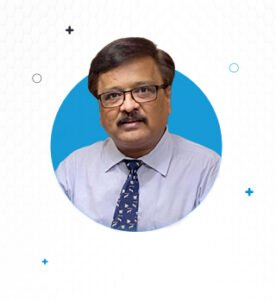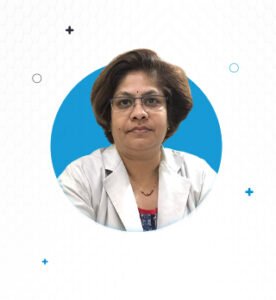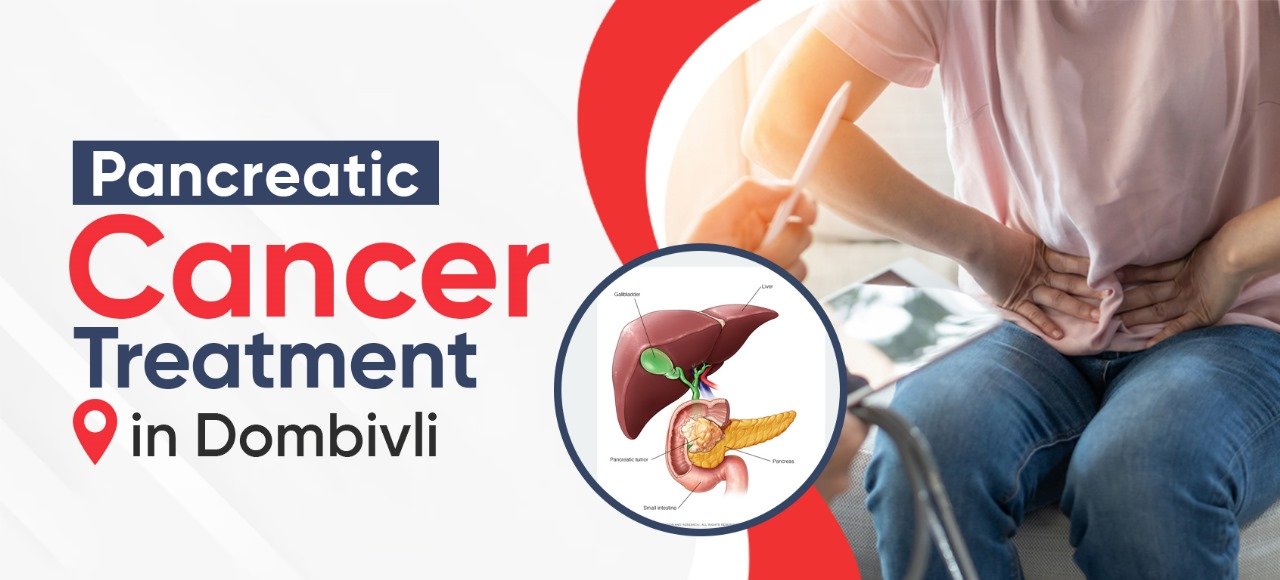

Expert Pancreatic Cancer Treatment in Dombivli at Jeevanshree Hospital
Pancreatic cancer is a serious and complex condition that requires timely and expert intervention. At Jeevanshree Hospital in Dombivli, patients benefit from advanced pancreatic cancer treatment provided by Dr. Rahul Mahadar, a highly experienced and renowned pancreatic cancer specialist. With cutting-edge technologies and personalized care plans, Jeevanshree Hospital is the go-to center for anyone seeking effective Pancreatic cancer Treatment in Dombivli

Dr. Rahul Mahadar is a Senior Gastrointestinal Surgeon with over 24 years of experience, specializing in pancreatic cancer treatment and advanced gastrointestinal surgeries at Jeevanshree Hospital in Dombivli. Nationally and internationally recognized for his skills, Dr. Mahadar has performed more than 15,000 complex surgeries using laparoscopic techniques.
As a global teaching faculty, he has conducted numerous workshops in Abdominal Wall Reconstruction Surgery, advanced laparoscopic surgery, and bariatric surgery. Dr. Mahadar has earned multiple international fellowships from France, the USA, South Korea, and Taiwan.
At Jeevanshree Hospital, Dr. Mahadar is a pioneer in Minimally Invasive Abdominal Wall Reconstruction Surgery and is a life member of various esteemed surgical organizations. His dedication to innovative techniques and patient care makes him a leading name in pancreatic cancer treatment in Dombivli.
SUPER –SPECIALTY CARE FOR GASTROINTESTINAL AND ENT DISEASES
Advanced Laparoscopic Hospital
Cutting-edge laparoscopic surgery center with highly skilled surgeons and advanced technology.
Well Equipped
State-of-the-art facility with advanced equipment for top-quality healthcare services.
Quality Medicines
Premium medications for superior healthcare outcomes and patient well-being.
Experienced Staff
Highly skilled professionals providing exceptional care and expertise to patients.
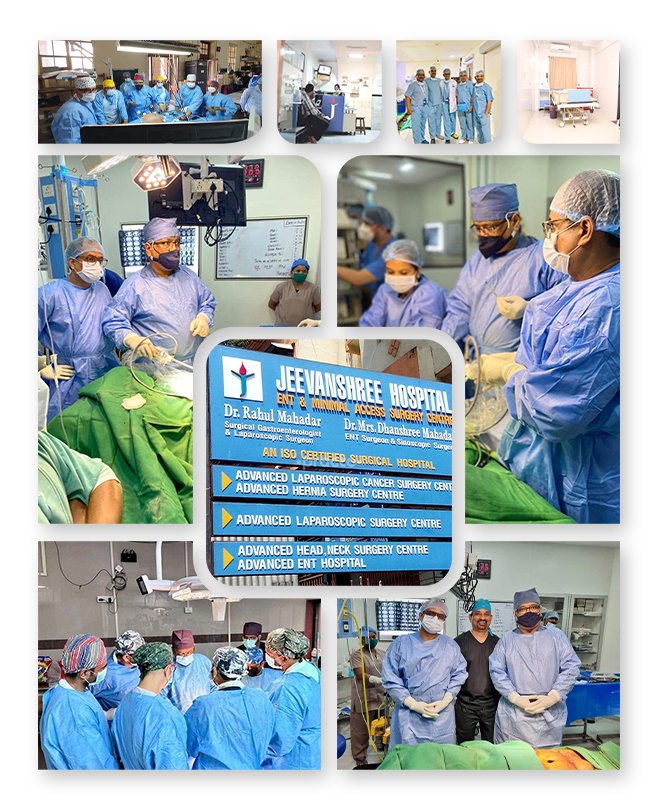

Complimentary counseling services for personalized medical guidance and support.

Highly experienced and skilled doctors providing exceptional medical expertise and care.

Convenient online bill payment options for hassle-free transactions and convenience.
Surgery For Hiatal Hernia
Hiatal Hernia Surgery Hiatal Hernia is a medical condition where a portion of the stomach…
Surgery For Gerd
Surgery For Gerd GERD, or Gastroesophageal Reflux Disease, is a chronic condition characterized by the…
Laparoscopic Colon Cancer Surgery
Laparoscopic Colon Cancer Surgery Laparoscopic Colon Cancer Surgery, also known as minimally invasive or keyhole…
Coloproctology
Coloproctology Coloproctology, also known as colorectal surgery or proctology, is a specialized field of medicine…
Bloodless Tonsils Surgery
Bloodless Tonsils Surgery Bloodless Tonsillectomy, also known as Coblation Tonsillectomy, is a surgical procedure performed…
Pilonidal Sinus Surgery
Pilonidal Sinus Surgery Pilonidal Sinus (also known as Pilonidal Cyst or Sacrococcygeal Fistula) is a…
Anal Fissure Surgery
Anal Fissure Surgery An Anal Fissure is a small tear or cut in the lining…
Laser Piles Surgery
Laser Piles Surgery Laser Piles Surgery, also known as Laser Hemorrhoidoplasty or Laser Hemorrhoidectomy, is…
Laser Fistula Surgery
Laser Fistula Surgery Laser Fistula Surgery, also known as Laser Fistulotomy or Laser Ablation Of…
Therapeutic Endoscopy Surgery
Therapeutic Endoscopy Surgery : Exploring Procedures, Benefits, and Types At Jeevanshree Hospital, we specialize in…
Trustindex verifies that the original source of the review is Google. I underwent laparoscopic surgery for hernia , I had a wonderful experience at the hospital. The surgery went well and I am contented by the surgical treatment. The staff is very well organized and follows good ethics.Posted onTrustindex verifies that the original source of the review is Google. I had to undergo endoscopic sinus surgery, which felt daunting, but the care I received made all the difference. The nurses and maushis were incredibly humble, kind, and attentive, making me feel at home and safe throughout my stay. Their support before, during, and after surgery reassured me and eased my recovery. The warmth and dedication of the entire staff turned the hospital into more than just a place of treatment—it felt like a home away from home. I am truly grateful for their compassion and care.Posted onTrustindex verifies that the original source of the review is Google. a few months ago, my husband underwent surgery at Jeevanshree Hospital. We were very scared to have the surgery. We were very tense, but Dr. Dhanashree Mahadar supported us. Before coming to Jeevanshree Hospital, we had also visited some other hospitals but we were very scared about the operation there but Dr. Dhanashree Mahadar explained to us clearly what the operation was and how it was to be done. Dr. Dhanashree Mahadar had made a very good decision regarding the operation, so the operation was successful. The entire staff at the hospital is very supportive and very good. I highly recommend Dr. Dhanashree Mahadar to anyone in need of expert medical treatment delivered with genuine care.Posted onTrustindex verifies that the original source of the review is Google. I got operated for hernia on both sides and the operation was highly successful.The doctor is highly experienced and very knowledgeable.He is very helpful and also the supporting staff.I was able to walk within ten hours after operation.It is really remarkable.God bless the doctorPosted onTrustindex verifies that the original source of the review is Google. I recently underwent surgery under the care of Dr. Dhanashree Mahadar, and I couldn't be more grateful. Dr. Mahadar is not only highly skilled and knowledgeable but also incredibly kind and compassionate. She took the time to explain every step of the procedure and ensured I felt comfortable and confident throughout the process. Her attention to detail and dedication to patient care is truly commendable. I highly recommend Dr. Mahadar to anyone in need of expert medical treatment delivered with genuine care.

What is Pancreatic Cancer?
Pancreatic cancer occurs when cells in the pancreas, a gland located behind the stomach, begin to grow uncontrollably, forming a tumor. The pancreas is vital for digestion and regulating blood sugar levels through insulin production. Pancreatic cancer is often difficult to detect in its early stages because symptoms may be subtle or mistaken for other conditions.
There are two main types of pancreatic cancer:
- Exocrine Tumors: The most common type, these tumors affect the exocrine cells that produce digestive enzymes.
- Endocrine Tumors: Less common, these tumors affect the endocrine cells responsible for hormone production, like insulin.
Given its severity, it is crucial to seek treatment from a specialized pancreatic cancer doctor in Dombivli, such as Dr. Rahul Mahadar at Jeevanshree Hospital, to ensure accurate diagnosis and proper management.
Symptoms of Pancreatic Cancer
Recognizing the early symptoms of pancreatic cancer is crucial for improving the chances of successful treatment. Common signs include:
- Abdominal pain (often radiating to the back).
- Jaundice (yellowing of the skin and eyes).
- Unexplained weight loss and loss of appetite.
- Digestive issues such as nausea, vomiting, and changes in bowel movements.
- Dark urine and light-colored stools.
If you experience any of these symptoms, it is important to consult a Pancreatic cancer Speciality in Dombivli like Dr. Rahul Mahadar at Jeevanshree Hospital. Early detection can significantly improve treatment outcomes.
Diagnosing Pancreatic Cancer
Accurate and early diagnosis is crucial for effective treatment of pancreatic cancer. Diagnosis typically involves a combination of advanced imaging tests, biopsies, and blood tests, which provide detailed insights into the presence and stage of cancer. Based on these results, a personalized treatment plan can be developed.
Common diagnostic methods include:
- CT Scans and MRIs for detailed images of the pancreas.
- Endoscopic Ultrasound to examine the pancreas and nearby tissues.
- Biopsy to confirm the presence of cancer cells.
- Blood Tests to detect specific cancer markers.
Early diagnosis can significantly improve treatment outcomes and recovery chances.
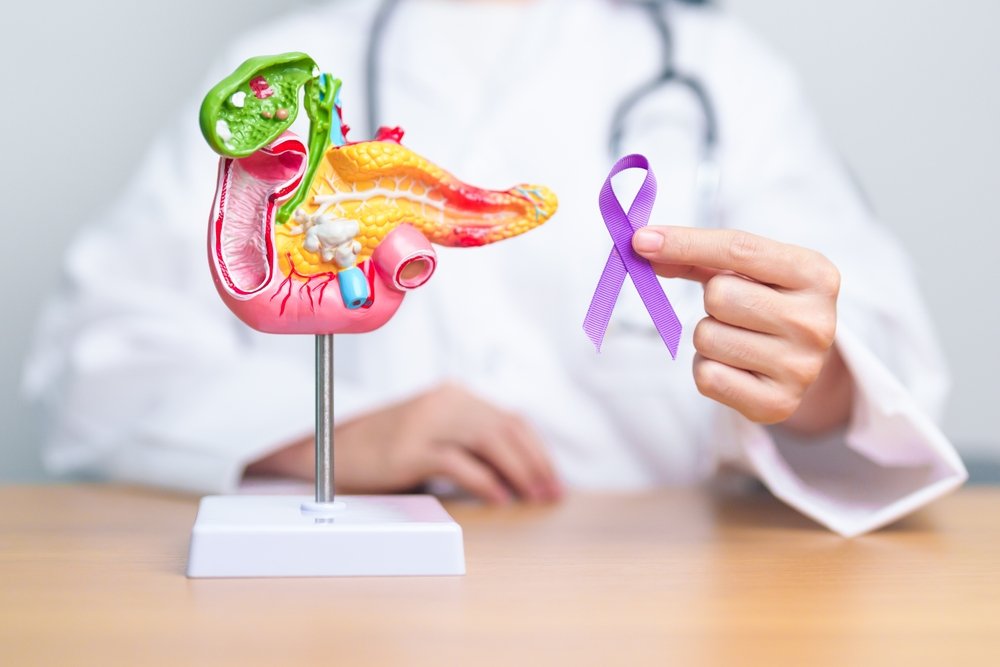
Importance of Early Detection in Pancreatic Cancer
Early detection of pancreatic cancer plays a crucial role in improving survival rates. Unfortunately, pancreatic cancer is often diagnosed at a later stage, making it harder to treat. Regular check-ups and being aware of the symptoms can make a significant difference. Jeevanshree Hospital emphasizes the importance of early screening, especially for individuals with a family history of cancer or known risk factors like smoking, obesity, or diabetes.
By catching the disease early, Dr. Rahul Mahadar can recommend timely pancreatic cancer treatment in Dombivli, which could include surgery, chemotherapy, or other advanced options that offer better outcomes.
Pancreatic Cancer Treatment Options in Dombivli
When it comes to pancreatic cancer treatment in Dombivli, Jeevanshree Hospital offers a comprehensive range of advanced therapies designed to combat the disease effectively.
Surgery
For patients diagnosed in the early stages, surgery is often the best option. Dr. Rahul Mahadar, one of the best pancreatic cancer surgeons in Dombivli, specializes in minimally invasive surgeries that aim to remove cancerous tumors while preserving as much healthy tissue as possible. Pancreatic cancer surgery in Dombivli at Jeevanshree Hospital ensures that patients receive top-quality care with the latest surgical techniques.
Chemotherapy and Radiation
For more advanced stages of pancreatic cancer, Jeevanshree Hospital provides state-of-the-art chemotherapy and radiation therapies. Under Dr. Rahul Mahadar’s supervision, these treatments are customized for each patient, targeting cancer cells and reducing tumor growth.
Targeted Therapy and Immunotherapy
Newer treatments like targeted therapy and immunotherapy are also available at Jeevanshree Hospital. These therapies focus on attacking specific cancer cells, which can lead to more effective results with fewer side effects. Dr. Rahul Mahadar ensures that patients are evaluated to see if these advanced treatments are suitable for their condition.
Why Choose Dr. Rahul Mahadar and Jeevanshree Hospital for Pancreatic Cancer Treatment?
Choosing the right doctor and hospital can make a significant difference in the success of pancreatic cancer treatment. Dr. Rahul Mahadar, a leading pancreatic cancer surgeon in Dombivli, is highly regarded for his expertise, compassionate care, and use of the latest medical advancements. At Jeevanshree Hospital, patients benefit from personalized care plans, advanced diagnostic tools, and a multidisciplinary approach to pancreatic cancer treatment.
Aftercare and Support at Jeevanshree Hospital
Recovering from pancreatic cancer surgery requires comprehensive aftercare, and Jeevanshree Hospital provides all the necessary support services. From rehabilitation programs to emotional counseling, Dr. Rahul Mahadar ensures that patients have access to the best resources for a smooth recovery. The hospital also offers follow-up care to monitor patient progress and ensure long-term well-being.
Conclusion
For those seeking the best pancreatic cancer treatment in Dombivli, Jeevanshree Hospital, led by Dr. Rahul Mahadar, is the ideal choice. With advanced treatments, state-of-the-art facilities, and a patient-first approach, the hospital provides comprehensive care for pancreatic cancer patients. If you or a loved one are experiencing symptoms, don’t wait contact Dr. Rahul Mahadar at Jeevanshree Hospital today to begin your journey toward recovery
Frequently Asked Questions
The common symptoms of pancreatic cancer include abdominal pain (often radiating to the back), jaundice (yellowing of the skin and eyes), unexplained weight loss, loss of appetite, digestive issues, dark urine, and light-colored stools. Early detection is crucial for better treatment outcomes.
Treatment options for pancreatic cancer include surgery, chemotherapy, radiation therapy, targeted therapy, and immunotherapy. The choice of treatment depends on the stage of cancer and the patient’s overall health.
The success rate of pancreatic cancer treatment depends on several factors, including the stage of cancer at the time of diagnosis, the type of treatment used, and the patient’s overall health. Early detection and advanced treatments can improve outcomes.
Yes, minimally invasive surgeries, such as laparoscopic or robotic-assisted procedures, are often available for pancreatic cancer. These techniques may offer faster recovery and fewer complications compared to traditional surgery.
The recovery time after pancreatic cancer surgery varies depending on the type of surgery performed, the patient’s overall health, and how well the surgery goes. On average, it can take several weeks to a few months to fully recover.
Yes, in addition to traditional treatments like surgery and chemotherapy, advanced options such as targeted therapy and immunotherapy are available. These therapies focus on attacking specific cancer cells, which may reduce side effects and improve outcomes.
Early detection is vital in pancreatic cancer treatment because it increases the chances of successful treatment. Pancreatic cancer often goes undetected in its early stages, so regular check-ups and awareness of symptoms can lead to better outcomes.
Chemotherapy can be used as a standalone treatment in some cases, especially in advanced stages of pancreatic cancer, or it may be combined with surgery or radiation therapy. The treatment plan depends on the individual patient’s condition.
Risk factors for pancreatic cancer include smoking, a family history of pancreatic cancer, chronic pancreatitis, obesity, and diabetes. It is advisable to consult a healthcare provider if you have any of these risk factors or experience symptoms.
Follow-up care typically involves regular doctor visits, imaging tests, and blood tests to monitor for any signs of cancer recurrence. Post-surgery care may also include physical therapy, nutritional support, and emotional counseling to help with recovery.


